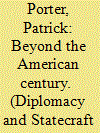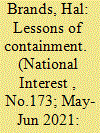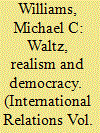| Srl | Item |
| 1 |
ID:
108882


|
|
|
|
|
| Publication |
2011.
|
| Summary/Abstract |
As the United States became a world Power, journalist and intellectual Walter Lippmann feared that it would become its own worst enemy. During and after the Second World War, he tried to steer the country towards coherent statecraft, to define the national interest and the limits of power, and give geopolitical expression to the role of the United States as the core of an Atlantic strategic system. But in response to world war, the Truman Doctrine, and the Korean War, he became pessimistic about the country's ability to conduct strategy effectively. In the prophetic tradition, he believed that a fatal symbiosis between America's growing strength and domestic politics led it towards crisis. Though at times ahistorical, Lippmann's concept of strategy deserves attention for its dialogue between power and identity, for its questioning of "ends" as well as means, and for its focus on the danger of self-defeating behaviour.
|
|
|
|
|
|
|
|
|
|
|
|
|
|
|
|
| 2 |
ID:
181600


|
|
|
|
|
| Summary/Abstract |
Walter Lippmann was right that the Cold War would expose America to great evils. He was wrong to think that America could not, or should not, accept them as the price of avoiding even greater ones.
|
|
|
|
|
|
|
|
|
|
|
|
|
|
|
|
| 3 |
ID:
092034


|
|
|
|
|
| Publication |
2009.
|
| Summary/Abstract |
Waltz is generally seen as one the most important advocates of a systemic theory of international politics that stresses the importance of international anarchy and marginalizes domestic politics. Locating Waltz's thinking against debates within realism in the 1950s, and drawing especially on his neglected Foreign Policy and Democratic Politics, this article argues that Waltz's thinking actually contains powerful domestic political dimensions that centre on a defence of democratic foreign policymaking. Rather than marginalizing domestic politics, Waltz's theory - and his critique of classical realism - is in part actually a subtle intervention in domestic politics.
|
|
|
|
|
|
|
|
|
|
|
|
|
|
|
|